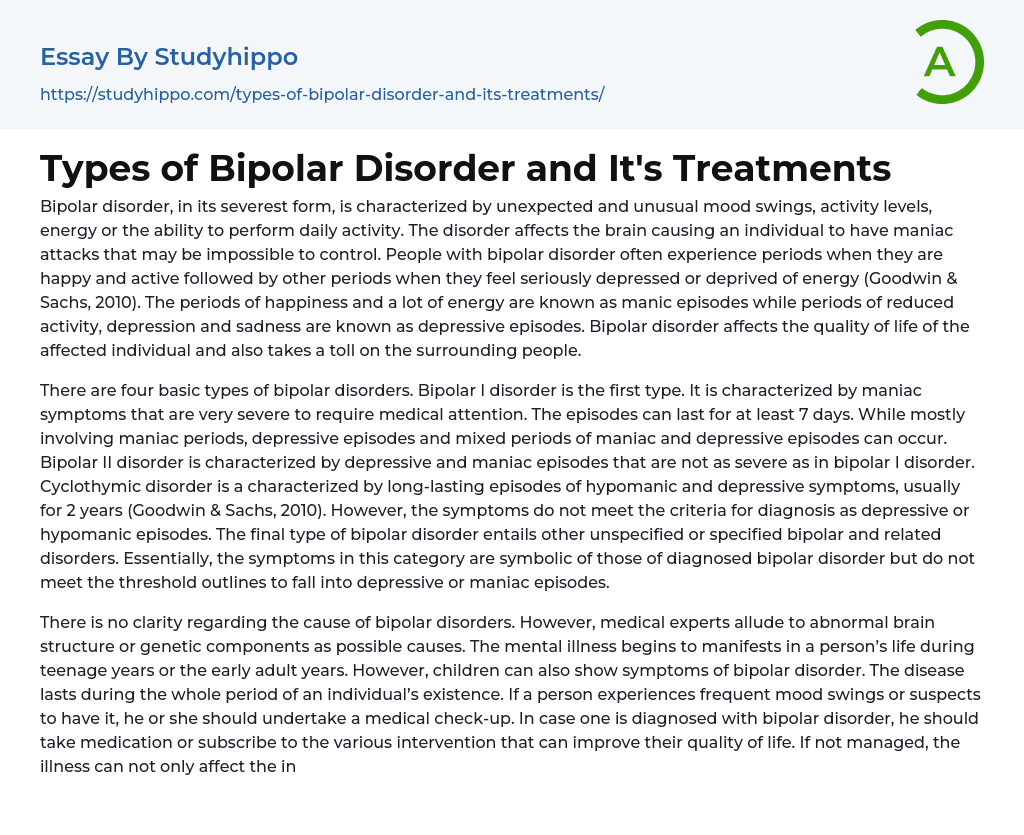

Types of Bipolar Disorder and It’s Treatments Essay Example
Bipolar disorder results in unpredictable and abnormal shifts in mood, activity levels, energy, and daily functioning. It impacts the brain and causes uncontrollable manic episodes. People with bipolar disorder experience alternating periods of elevated mood and heightened energy, as well as periods of severe depression and reduced energy (Goodwin & Sachs, 2010).
Bipolar disorder is defined by manic episodes, which encompass periods of happiness and high energy, as well as depressive episodes with reduced activity and sadness. These episodes not only impact the individual's quality of life but also affect others. There are four primary forms of bipolar disorder, with Bipolar I being the initial type. Bipolar I is distinguished by severe manic symptoms that necessitate medical intervention and can persist for a minimum of 7 days.
Bipolar II disorder is a less severe form of bipolar I disorder, characterized by milder
...episodes of mania and depression. It can present as depressive episodes, manic episodes, or mixed episodes. In contrast, cyclothymic disorder lasts for about 2 years and includes extended periods of hypomania and depression that do not meet the criteria for diagnosing depressive or hypomanic episodes. Additionally, there are other unspecified or specified bipolar and related disorders with symptoms similar to diagnosed bipolar disorder but that do not meet the requirements to be classified as depressive or manic episodes.
While the cause of bipolar disorders is not completely understood, medical professionals believe that it may be influenced by abnormal brain structure or genetic factors. This mental illness usually appears during adolescence or early adulthood, but can also manifest in children. Furthermore, bipolar disorder is a lifelong condition.
It is essential for individuals who frequently experience mood swings o
suspect they might to undergo a medical evaluation. If diagnosed with bipolar disorder, adhering to the prescribed medication or exploring various interventions can significantly improve overall quality of life. Neglecting proper management of this condition can have severe repercussions for both the individual and society as a whole. Failing to seek treatment for bipolar disorder can detrimentally impact academic or occupational performance, relationships, and even result in suicidal thoughts. Additionally, the illness hinders concentration at work or school and may expose individuals to social stigma within these environments.
The illness has an impact on the person's dedication to their job or education as well as their connections with loved ones. It results in a sense of detachment from close family members, leading to confusion and tension (Goodwin & Sachs, 2010). Furthermore, individuals may feel isolated from society due to the negative perceptions associated with mental health conditions.
Individuals with bipolar disorder may isolate themselves from society as their symptoms progress. Alienation can also result from a lack of understanding about the illness by society members. If people feel unable to offer assistance or if the disorder disrupts their lives, they may create social distance. To handle the social isolation and stigma associated with bipolar disorder, individuals may turn to substance abuse. In some cases, thoughts of suicide may even arise.
References
- Goodwin, G., & Sachs, G. (2010). Bipolar Disorder. Abingdon: HEALTH Press.
- Suicide Prevention essays
- Adhd essays
- Antisocial Personality Disorder essays
- Anxiety essays
- Bipolar Disorder essays
- Depression essays
- Depression And Anxiety essays
- Dyslexia essays
- Learning Disability essays
- Major Depressive Disorder essays
- Mental Disorder essays
- Mental Illness essays
- Psychosis essays
- Schizophrenia essays
- Stress essays
- Suicide essays
- Teenage Drinking essays
- Teenage Suicide essays



